Other People's Kitchens Q&A with Maaike Siegel.
Discover life as a chef in a spiritual retreat center nestled in the Swiss Alps.
Q - Hello Maaike. Can you please tell us a little about yourself, where you live and your substack publication?
Hi, I'm Maaike! I'm 32 years old and live in Utrecht, the Netherlands. I call myself The Unconventional Chef because my path to the kitchen has been anything but traditional. I only recently became a chef, but the joy of cooking has completely transformed my life.
Last year, I took a leap of faith—I quit my office job, moved to Switzerland, and unexpectedly fell in love with both the mountains and cooking.
I became the head chef at a vegetarian and vegan retreat, immersing myself in a work environment that felt truly fulfilling. Now back in the Netherlands, I couldn't shake my passion for cooking. So, I decided to continue as a restaurant chef while slowly building my own catering and meal service.
Transitioning from a corporate job to a chef's life has been an exciting challenge. I've realized there’s so much to learn, from mastering basic techniques to developing a deeper understanding of ingredients. That’s why I started my Substack publication—to document my journey, share what I learn, and explore food in an unconventional way.
Q - Can you please describe the layout of your kitchen, how much of a role does it play with your family, when writing for your publication ‘The Unconventional.’
A - I’m a single woman who, thanks to my corporate job, was fortunate enough to buy my own (tiny) house—and two years ago, I renovated my kitchen. It’s my happy place. It’s where I experiment with new recipes, host friends for cozy evenings of cooking and tasting, and, of course, photograph and write about food.
Spending the past year and a half abroad has given me a whole new appreciation for my kitchen and all my tools. There’s something incredibly joyful about having everything in one place again, ready for new culinary adventures.
As I work toward building my own catering and meal service, I’ve squeezed even more storage into my little home—because making my dream of becoming a full-time chef a reality is worth every inch of space.
Q - What are your most used kitchen gadgets and kitchen gear, that you cannot live without?
A - This past year taught me that you can truly cook without having everything at your fingertips. It takes some improvisation and a lot of patience, but you don’t need fancy gear to create fancy meals. That said, there’s one thing I never travel without—my knives. No chef can do without those babies.
The one kitchen tool I truly missed, though, was my Magimix. Especially when cooking vegetarian and vegan dishes, it’s a game-changer. There’s nothing like a powerful food processor to make hummus ultra-creamy or to chop, crush, and blend ingredients effortlessly. Now that I have it back, I appreciate it more than ever!
Q - You relocated to Switzerland—could you share what motivated this decision and how smoothly you adapted to a different lifestyle?
A - Stuck in an office job that didn’t truly make me happy, I decided to quit my role as a strategic data lead and take a sort of gap year. I had always dreamed of living in the mountains, so Switzerland quickly became the obvious choice. Through a friend, I came across a vacancy for a head chef position at Schweibenalp, a spiritual retreat center nestled in the Swiss Alps. Taking a bold leap, I applied—hoping for a spot in the kitchen. To my surprise, they believed in me so much that they hired me as head chef right away. After three months of training under the current head chef, I took over the role entirely.
While adjusting to the Swiss culture wasn’t exactly smooth, I adapted quickly to the fast-paced rhythm of kitchen life. At work, I found myself in a state of flow—constantly experimenting, learning, and thriving in the creative energy of cooking. But outside the kitchen, it was a different story.
Fitting into Swiss culture proved far more challenging. People were polite but distant, and deeply self-contained. If you struggled, you were expected to figure things out on your own—which often left me feeling lonely. And as a Dutch person, even within Europe, I was often seen as too direct and honest. People avoided confrontation, withheld feedback, and swept difficult conversations under the rug.
The combination of stepping into a demanding head chef role (where I worked 60-hour weeks), being perceived as cold and blunt, and feeling isolated took a toll. After eight months, even the mountains lost their magic. What had started as an exciting adventure now felt like it was coming to an end.
Back home, my first instinct was to return to data—but I couldn’t shake the joy and flow I had found in cooking. So this year marks the start of a new adventure: becoming a chef.
Q - What inspired you to become a vegetarian and also write about becoming a Plant based chef?
A - I’ve been vegetarian for a few years now, and the more I learn about our planet, our food system, and its impact on our health, the more convinced I am that we can do better. As a plant-based chef, I want to inspire people to embrace more plant-based meals—not through strict labels, but by simply showing how delicious and satisfying they can be. If more people are open to enjoying a great vegetarian or vegan dish, we’ve already come a long way.
Because these values have been close to my heart for years, training as a traditional all-round chef didn’t feel right. I want to stay true to what I believe in and inspire others through plant-based cooking.
Q - How would you describe the regional cuisine where you live? Are there fresh food markets, or farmers markets available?
A - We have some specialised, small shops and organizations that gather food from local, organic farmers, that you can order online and pick-up in the city centre and I love these small initiatives that strengthen local, organic farmers. I am obsessed with regenerative farming at the moment, but at the same time it takes a lot of time to really check organizations and find your food sources all locally, organic and in a sustainable way.
Big supermarkets make it so easy to buy strawberries in December and everything we can wish for in one place that it takes a lot of determination to go off the beaten track.
In Switzerland, there was more of a seasonal offering and they would focus on Swiss produced products first. I think this is a good approach, because here in the Netherlands, everything has to be cheap and convenient, without looking at the real costs of things.
Q - Is there anything about your kitchen that you would like to change or improve on?
A - I am in the middle of expanding my kitchen with a new pantry and fridge for my meal service.
Q - What tips can you give us that will help keep our kitchens neat and tidy and easy to manage.
A - Always have lots of (glass) containers, so you can easily pack something away, store it and freeze it.
And check, check and double check again. Did you label everything correctly? Are all the lids closed? Is the kitchen really spotless?
As a chef, you need to love a bit of cleaning too. If you are scrubbing the stove, imagine you’re actually cleaning up and organizing your own heart :)
Q - How many cookbooks do you have and do you have any favourites? Have you written any cookbooks?
A - I have about 10 cookbooks. I love to be inspired, but I never really follow a recipe. That said, I currently go to the library quite a lot to lend some beautiful cookbooks and pick out the things I want to try. My favourite cookbook is ‘Slow’ from Georgina Hayden. It is a book full of comfort food.
Q - Do you have a favourite recipe that you would like to share with us?
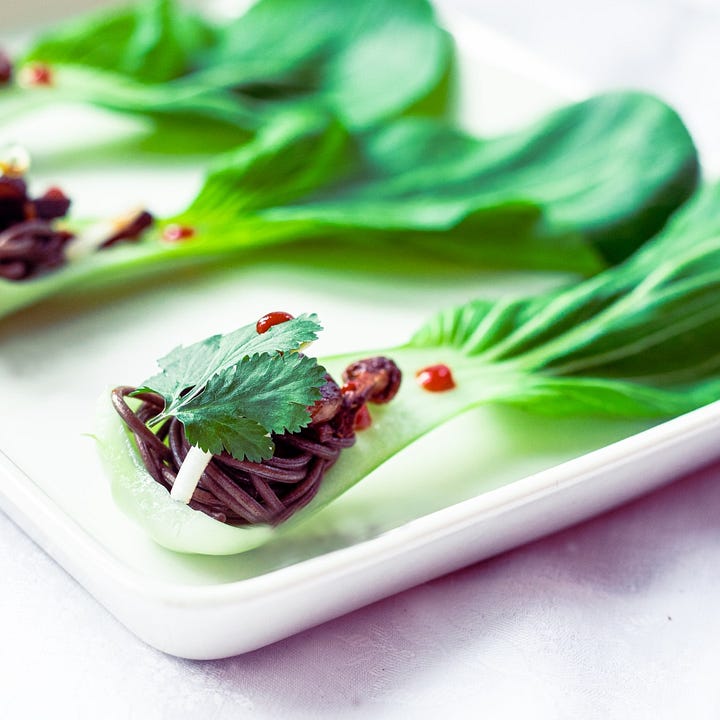
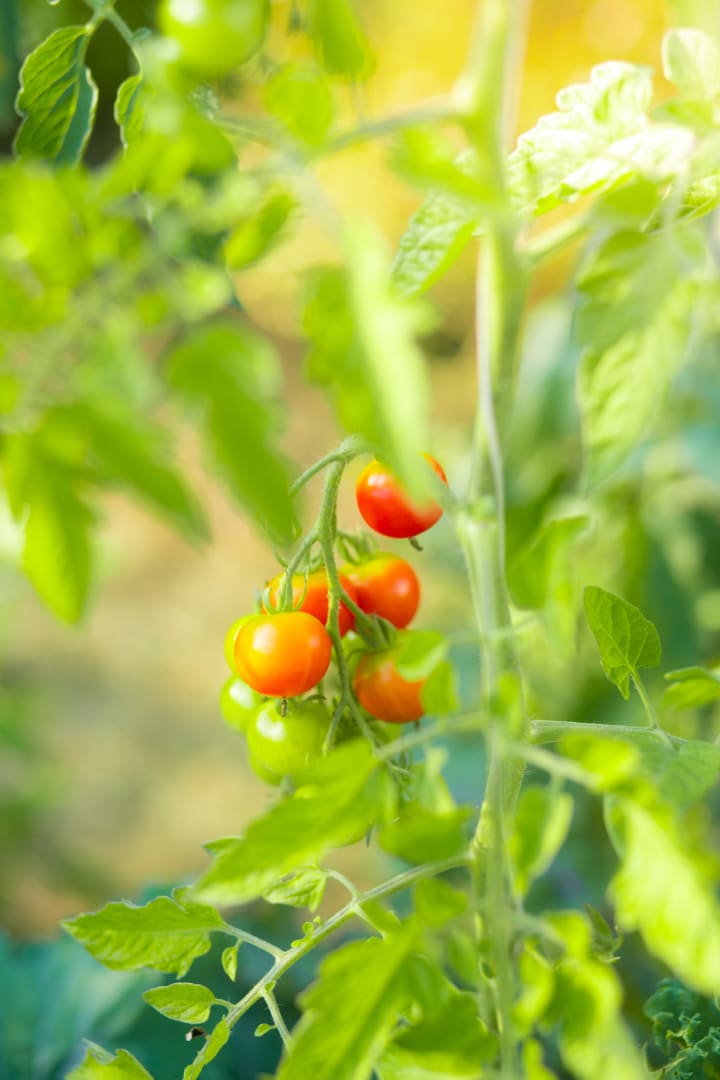
A - I was pleasantly surprised about building up a flavor base for your dishes. Yes it takes a bit of extra time, but yes it is so worth it.
Q - Have you had any kitchen disasters that you can share with us?
A - Back when I was a student, a friend had just returned from a trip to India, raving about the incredible food. Inspired (and perhaps a little overconfident), we decided to make naan bread in a pan in our tiny student kitchen. What could possibly go wrong?
Well, for starters, the extractor fan didn’t do its job. Within minutes, the kitchen was filled with thick smoke, seeping through the windows and setting off mild panic. It got so bad that our neighbor came over to check if the house was on fire. Spoiler: it wasn’t—but our naan almost was.
As for the result? Let’s just say it tasted like unsalted, slightly burnt cardboard. And to top it off, the smell lingered for days.
Thank you so much
for inviting us into your kitchen.Visit and subscribe to ‘The Unconventional’
Read more from the series: Q&A: Other People’s Kitchens
Thank you. Lynn H. (FSL)
Want to be featured?
If you would like to be featured in any of the Q&A series, please contact Lynn foodstacklibrary@gmail.com Please indicate which series you would like to be featured. eg Other People’s Kitchens or Other People’s Bookshelves.
Other Links;
Main Library | Recipes | Kitchen Tips | FSL Index | Q&A: Other People’s Kitchens | Q&A Other People’s Bookshelves | FoodStack Reads | Recommendations

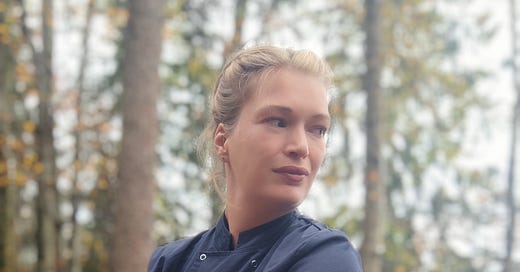




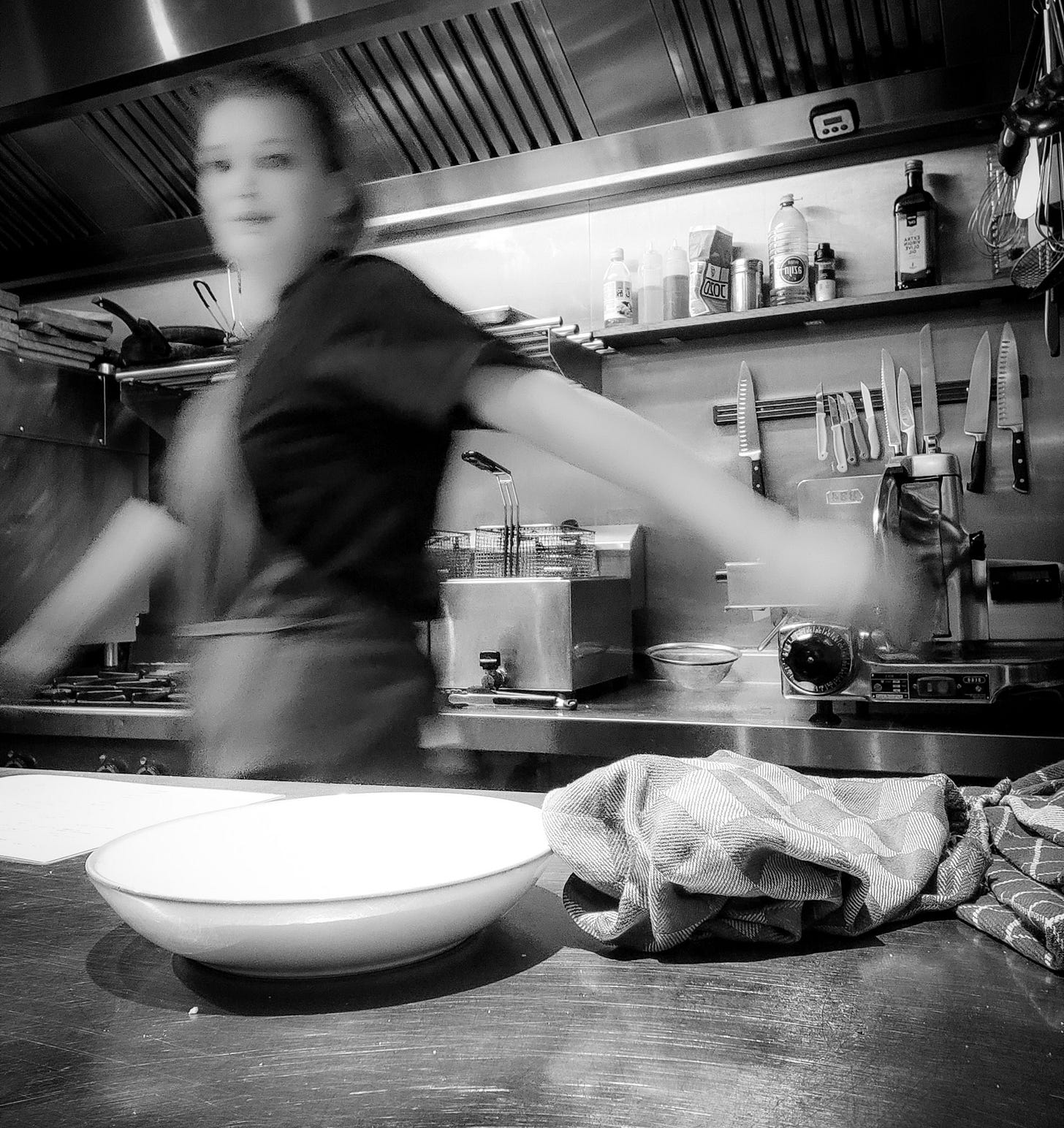
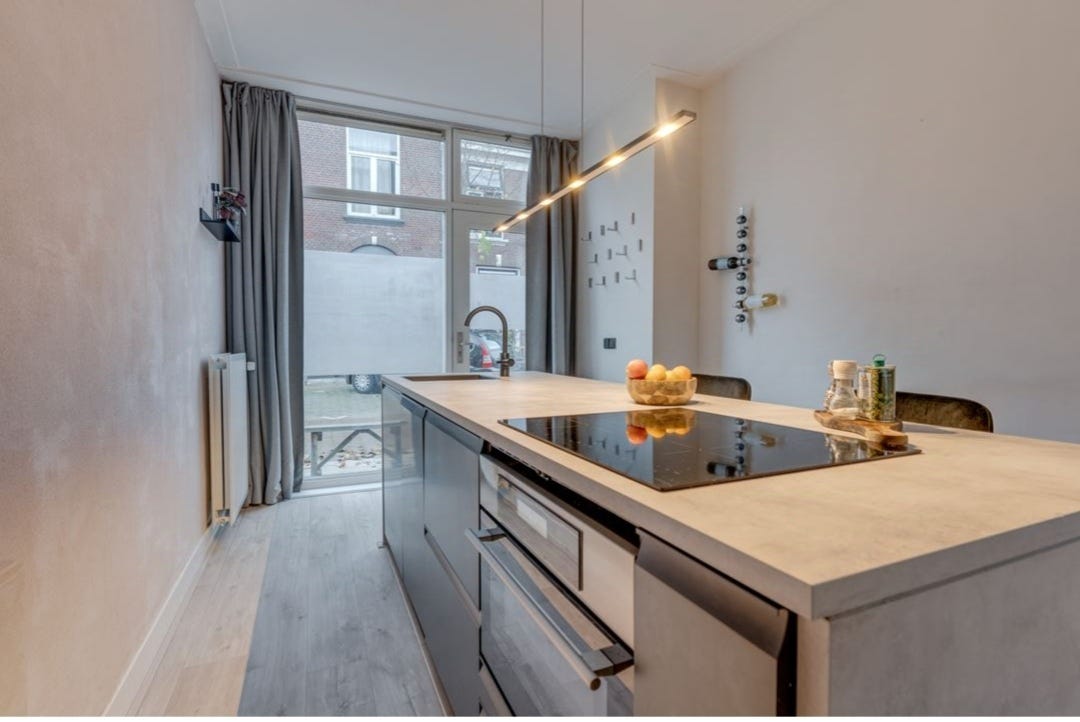



How did you decide on the induction stove and does it liberate your cooking? Lovely to be introduced to your streamlined kitchen
Love the clean lines of your kitchen. We relocated nine years ago. Going from a huge kitchen to a small one is no easy feat. I have a 'speed' rack so that I can easily store and/or cool sheet trays of things. When I have a larger freelance job, as I did Tuesday - this really helps.
Keeping things ship shape is more difficult when you share the space with a family. Thus my kitchen envy regarding your lovely space!